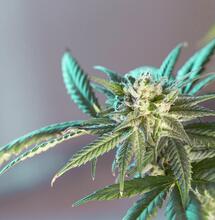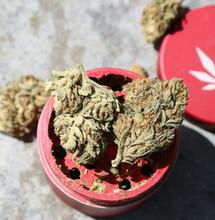Why pot taxes can’t solve Colorado’s budget problems

A customer counts out cash for a transaction at the Native Roots pot shop in Boulder County. Marijuana sales in Colorado are subject to the regular state sales tax of 2.9 percent. In addition, recreational sales are subject to a special 15 percent excise tax and a 10 percent sales tax.
 “What do you mean the state has budget troubles? What about all the tax money from marijuana? Wasn’t that supposed to solve everything?”
As a nonprofit devoted to educating Coloradans on the state’s unique fiscal challenges, we get that question almost every time now. It doesn’t matter what group we’re talking to about the state budget or which community in Colorado we’re visiting.
Ever since recreational marijuana became legal, there has been a seemingly unstoppable urban myth going around that the state is positively swimming in tax revenue from pot sales.
Let’s dive into that pool and get some real numbers.
First, let’s note that all marijuana sales — recreational and medical — are subject to the regular state sales tax of 2.9 percent. In addition, recreational sales are subject to a special 15 percent excise tax and a 10 percent sales tax.
So, total taxes collected on recreational marijuana in fiscal year 2014-15, the first full year of taxes levied on recreational pot, were $77.9 million. Of that, $66.1 million came from the special state sales and excise taxes levied on recreational pot.
Now, $80 million sounds like a lot of money, but not really when you compare it against the state general fund of $9.7 billion. The general fund is the pot of money into which sales and income taxes go, and it funds schools, prisons, human services, higher education and a portion of health care, among other things.
And pot revenues represent less than 1 percent of that.
That percentage gets even smaller when you look at the total state budget of about $26 billion, a number that includes federal funds and cash funds.
And we have to look at where the pot money actually goes. By law, the first $40 million of the state excise tax collections goes to fund capital improvements for schools in rural areas, where it’s much harder to raise money to fix roofs, replace air conditioning systems or build an annex.
So, to be clear, none of the money collected on marijuana goes for operating costs in school districts. Put simply, reefer hires roofers, not teachers. And, compared to the long list of capital needs throughout the state, not nearly enough roofers.
The remaining pot tax revenue that doesn’t go to fix rural schools goes to marijuana education, treatment, regulation and enforcement programs.
The pot revenue hasn’t offset big cuts in K-12 funding that have occurred in recent years as a result of the so-called “negative factor” that has reduced school funding by $800 million below the level of where it was before the cuts. Colorado has dropped from 23rd in per pupil funding in 1993 to 40th now, and our per pupil funding is now $2,000 below the national average.
“But I heard Colorado now collects more in pot taxes than it does in alcohol taxes.” True, but what most people don’t know is that Colorado’s alcohol taxes are among the lowest in the country (our beer tax, for example, is the third-lowest in the U.S.)
None of the numbers I’ve just cited are meant to be critical of marijuana legalization. It’s just about putting things in perspective.
People get all jazzed up every time some new vice is taxed. The same thing happens when voters approve lotteries and casinos. They tend to think these sources will automatically pay for everything and that we no longer need to rely on the time-tested model of shared sacrifice. Now, someone else will pay the taxes, not us.
It just doesn’t work that way. State revenue systems across the country are made up of the traditional “three-legged stool” of income, sales and property taxes. Colorado has cut taxes in recent decades, and our constitutional restraints on the budget have made it worse.
There’s no gimmicking our way out of this problem.
Chris Stiffler is an economist for the Colorado Fiscal Institute.
SOURCE
The Denver Post
“What do you mean the state has budget troubles? What about all the tax money from marijuana? Wasn’t that supposed to solve everything?”
As a nonprofit devoted to educating Coloradans on the state’s unique fiscal challenges, we get that question almost every time now. It doesn’t matter what group we’re talking to about the state budget or which community in Colorado we’re visiting.
Ever since recreational marijuana became legal, there has been a seemingly unstoppable urban myth going around that the state is positively swimming in tax revenue from pot sales.
Let’s dive into that pool and get some real numbers.
First, let’s note that all marijuana sales — recreational and medical — are subject to the regular state sales tax of 2.9 percent. In addition, recreational sales are subject to a special 15 percent excise tax and a 10 percent sales tax.
So, total taxes collected on recreational marijuana in fiscal year 2014-15, the first full year of taxes levied on recreational pot, were $77.9 million. Of that, $66.1 million came from the special state sales and excise taxes levied on recreational pot.
Now, $80 million sounds like a lot of money, but not really when you compare it against the state general fund of $9.7 billion. The general fund is the pot of money into which sales and income taxes go, and it funds schools, prisons, human services, higher education and a portion of health care, among other things.
And pot revenues represent less than 1 percent of that.
That percentage gets even smaller when you look at the total state budget of about $26 billion, a number that includes federal funds and cash funds.
And we have to look at where the pot money actually goes. By law, the first $40 million of the state excise tax collections goes to fund capital improvements for schools in rural areas, where it’s much harder to raise money to fix roofs, replace air conditioning systems or build an annex.
So, to be clear, none of the money collected on marijuana goes for operating costs in school districts. Put simply, reefer hires roofers, not teachers. And, compared to the long list of capital needs throughout the state, not nearly enough roofers.
The remaining pot tax revenue that doesn’t go to fix rural schools goes to marijuana education, treatment, regulation and enforcement programs.
The pot revenue hasn’t offset big cuts in K-12 funding that have occurred in recent years as a result of the so-called “negative factor” that has reduced school funding by $800 million below the level of where it was before the cuts. Colorado has dropped from 23rd in per pupil funding in 1993 to 40th now, and our per pupil funding is now $2,000 below the national average.
“But I heard Colorado now collects more in pot taxes than it does in alcohol taxes.” True, but what most people don’t know is that Colorado’s alcohol taxes are among the lowest in the country (our beer tax, for example, is the third-lowest in the U.S.)
None of the numbers I’ve just cited are meant to be critical of marijuana legalization. It’s just about putting things in perspective.
People get all jazzed up every time some new vice is taxed. The same thing happens when voters approve lotteries and casinos. They tend to think these sources will automatically pay for everything and that we no longer need to rely on the time-tested model of shared sacrifice. Now, someone else will pay the taxes, not us.
It just doesn’t work that way. State revenue systems across the country are made up of the traditional “three-legged stool” of income, sales and property taxes. Colorado has cut taxes in recent decades, and our constitutional restraints on the budget have made it worse.
There’s no gimmicking our way out of this problem.
Chris Stiffler is an economist for the Colorado Fiscal Institute.
SOURCE
The Denver Post
 “What do you mean the state has budget troubles? What about all the tax money from marijuana? Wasn’t that supposed to solve everything?”
As a nonprofit devoted to educating Coloradans on the state’s unique fiscal challenges, we get that question almost every time now. It doesn’t matter what group we’re talking to about the state budget or which community in Colorado we’re visiting.
Ever since recreational marijuana became legal, there has been a seemingly unstoppable urban myth going around that the state is positively swimming in tax revenue from pot sales.
Let’s dive into that pool and get some real numbers.
First, let’s note that all marijuana sales — recreational and medical — are subject to the regular state sales tax of 2.9 percent. In addition, recreational sales are subject to a special 15 percent excise tax and a 10 percent sales tax.
So, total taxes collected on recreational marijuana in fiscal year 2014-15, the first full year of taxes levied on recreational pot, were $77.9 million. Of that, $66.1 million came from the special state sales and excise taxes levied on recreational pot.
Now, $80 million sounds like a lot of money, but not really when you compare it against the state general fund of $9.7 billion. The general fund is the pot of money into which sales and income taxes go, and it funds schools, prisons, human services, higher education and a portion of health care, among other things.
And pot revenues represent less than 1 percent of that.
That percentage gets even smaller when you look at the total state budget of about $26 billion, a number that includes federal funds and cash funds.
And we have to look at where the pot money actually goes. By law, the first $40 million of the state excise tax collections goes to fund capital improvements for schools in rural areas, where it’s much harder to raise money to fix roofs, replace air conditioning systems or build an annex.
So, to be clear, none of the money collected on marijuana goes for operating costs in school districts. Put simply, reefer hires roofers, not teachers. And, compared to the long list of capital needs throughout the state, not nearly enough roofers.
The remaining pot tax revenue that doesn’t go to fix rural schools goes to marijuana education, treatment, regulation and enforcement programs.
The pot revenue hasn’t offset big cuts in K-12 funding that have occurred in recent years as a result of the so-called “negative factor” that has reduced school funding by $800 million below the level of where it was before the cuts. Colorado has dropped from 23rd in per pupil funding in 1993 to 40th now, and our per pupil funding is now $2,000 below the national average.
“But I heard Colorado now collects more in pot taxes than it does in alcohol taxes.” True, but what most people don’t know is that Colorado’s alcohol taxes are among the lowest in the country (our beer tax, for example, is the third-lowest in the U.S.)
None of the numbers I’ve just cited are meant to be critical of marijuana legalization. It’s just about putting things in perspective.
People get all jazzed up every time some new vice is taxed. The same thing happens when voters approve lotteries and casinos. They tend to think these sources will automatically pay for everything and that we no longer need to rely on the time-tested model of shared sacrifice. Now, someone else will pay the taxes, not us.
It just doesn’t work that way. State revenue systems across the country are made up of the traditional “three-legged stool” of income, sales and property taxes. Colorado has cut taxes in recent decades, and our constitutional restraints on the budget have made it worse.
There’s no gimmicking our way out of this problem.
Chris Stiffler is an economist for the Colorado Fiscal Institute.
SOURCE
The Denver Post
“What do you mean the state has budget troubles? What about all the tax money from marijuana? Wasn’t that supposed to solve everything?”
As a nonprofit devoted to educating Coloradans on the state’s unique fiscal challenges, we get that question almost every time now. It doesn’t matter what group we’re talking to about the state budget or which community in Colorado we’re visiting.
Ever since recreational marijuana became legal, there has been a seemingly unstoppable urban myth going around that the state is positively swimming in tax revenue from pot sales.
Let’s dive into that pool and get some real numbers.
First, let’s note that all marijuana sales — recreational and medical — are subject to the regular state sales tax of 2.9 percent. In addition, recreational sales are subject to a special 15 percent excise tax and a 10 percent sales tax.
So, total taxes collected on recreational marijuana in fiscal year 2014-15, the first full year of taxes levied on recreational pot, were $77.9 million. Of that, $66.1 million came from the special state sales and excise taxes levied on recreational pot.
Now, $80 million sounds like a lot of money, but not really when you compare it against the state general fund of $9.7 billion. The general fund is the pot of money into which sales and income taxes go, and it funds schools, prisons, human services, higher education and a portion of health care, among other things.
And pot revenues represent less than 1 percent of that.
That percentage gets even smaller when you look at the total state budget of about $26 billion, a number that includes federal funds and cash funds.
And we have to look at where the pot money actually goes. By law, the first $40 million of the state excise tax collections goes to fund capital improvements for schools in rural areas, where it’s much harder to raise money to fix roofs, replace air conditioning systems or build an annex.
So, to be clear, none of the money collected on marijuana goes for operating costs in school districts. Put simply, reefer hires roofers, not teachers. And, compared to the long list of capital needs throughout the state, not nearly enough roofers.
The remaining pot tax revenue that doesn’t go to fix rural schools goes to marijuana education, treatment, regulation and enforcement programs.
The pot revenue hasn’t offset big cuts in K-12 funding that have occurred in recent years as a result of the so-called “negative factor” that has reduced school funding by $800 million below the level of where it was before the cuts. Colorado has dropped from 23rd in per pupil funding in 1993 to 40th now, and our per pupil funding is now $2,000 below the national average.
“But I heard Colorado now collects more in pot taxes than it does in alcohol taxes.” True, but what most people don’t know is that Colorado’s alcohol taxes are among the lowest in the country (our beer tax, for example, is the third-lowest in the U.S.)
None of the numbers I’ve just cited are meant to be critical of marijuana legalization. It’s just about putting things in perspective.
People get all jazzed up every time some new vice is taxed. The same thing happens when voters approve lotteries and casinos. They tend to think these sources will automatically pay for everything and that we no longer need to rely on the time-tested model of shared sacrifice. Now, someone else will pay the taxes, not us.
It just doesn’t work that way. State revenue systems across the country are made up of the traditional “three-legged stool” of income, sales and property taxes. Colorado has cut taxes in recent decades, and our constitutional restraints on the budget have made it worse.
There’s no gimmicking our way out of this problem.
Chris Stiffler is an economist for the Colorado Fiscal Institute.
SOURCE
The Denver Post
S
Soft Secrets



